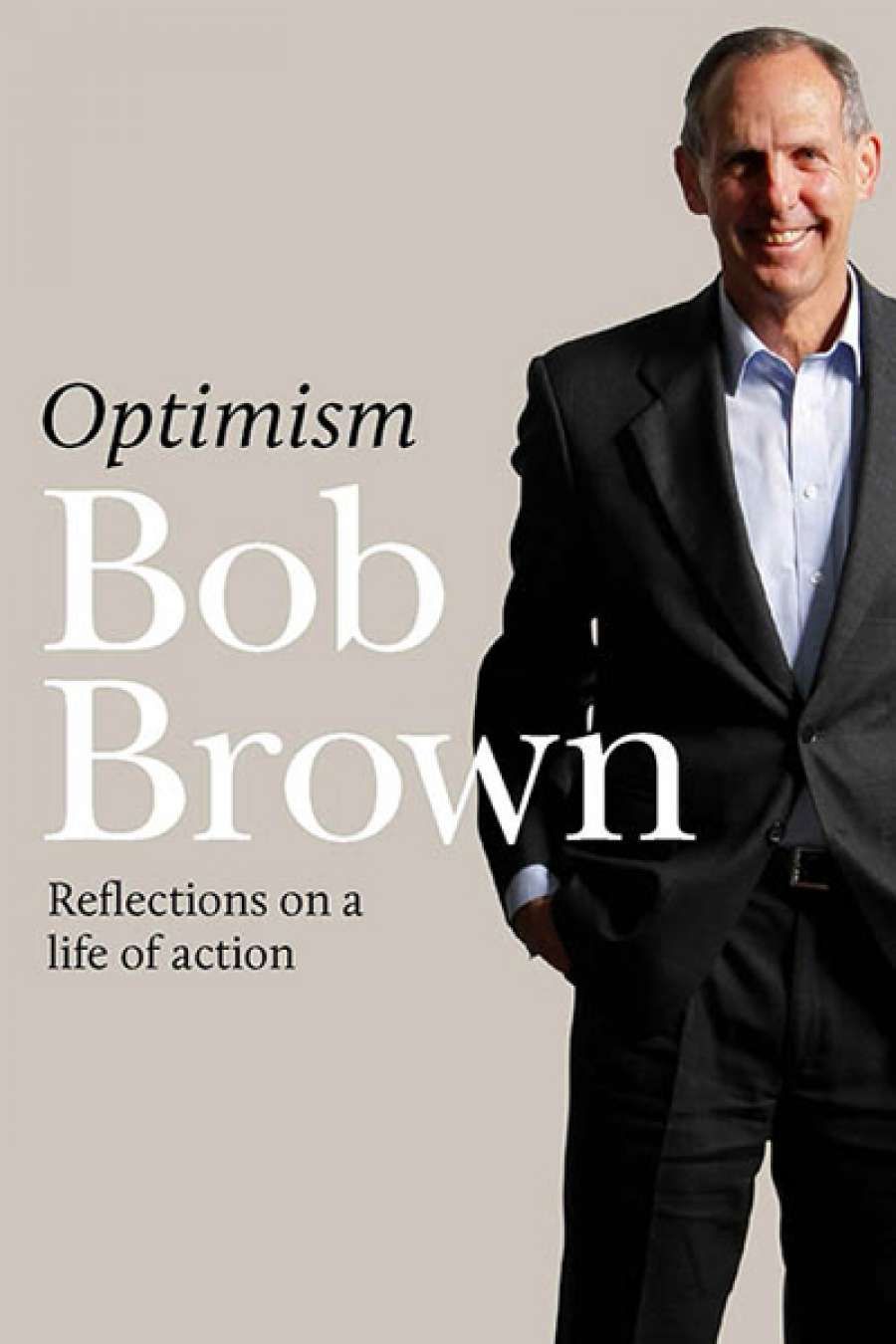
- Free Article: No
- Contents Category: Memoir
- Custom Article Title: Dennis Altman reviews 'Optimism' by Bob Brown
- Review Article: Yes
- Online Only: No
- Custom Highlight Text:
There is a built-in paradox for the Greens: they need to both persuade people that we face major ecological disasters and at the same time hold out hope that we can respond meaningfully to them. To do this requires the sort of corny and touching optimism that gives Bob Brown’s book its title.
Optimism is neither a conventional memoir nor a political autobiography; it is rather a collection of sketches from the life of a man who will be remembered as one of the pivotal figures of Australian politics in the two decades that straddle the new millennium. The style is largely prosaic, excepting moments of real feeling when Brown describes the Tasmanian wilderness and his relationship to it.
- Book 1 Title: Optimism
- Book 1 Subtitle: Reflections on a life of action
- Book 1 Biblio: Hardie Grant Books, $39.99 hb, 275 pp
Reading these passages, and from the forays into deep ecology, it is hard to remember that Brown is also one of the most successful politicians of his generation, the man who helped build the Greens into a substantial third party, negotiated extremely favourable terms in return for backing Julia Gillard in 2010, and then used his party’s position in the Senate to broaden the appeal of the Greens to the point where they could threaten to annex the progressive wing of Labor.
Indeed, it is hard to know who hated Brown more: the right, for whom he conveniently represents both anti-capitalism and immorality, or the Labor Party, for whom he became a ready scapegoat to blame for the defection of many potential supporters. I have not found Brown to be charismatic in person, but there is a dedication and a purpose which made him an inspiration for many. Since his departure from formal politics at the last election, his party has struggled to maintain their role of agenda setting, and has been upstaged by the populist antics of Clive Palmer, including Palmer’s appearance alongside Al Gore.
Bob Brown is roughly my age (he was born in 1944), and it is perhaps strange that we have met only twice; I grew up in Tasmania but had left when Brown came to Launceston as a young doctor, then became an enthusiastic environmentalist and one of the first Greens to enter Parliamentary politics. He was also the first openly gay man to be elected to an Australian Parliament, and some of Optimism speaks of his pain at coming to terms with his homosexuality in the late 1960s. Brown went to London partly to find ways of accepting his sexuality; I went to the States; by the time we returned to Australia we had each discovered the embryonic ideas of gay liberation. Brown speaks of a determination to help other homosexuals, but after a brief attempt to achieve law reform as a member of the Tasmanian Parliament, he had strangely little contact with the growing gay movement until the early 1990s, when the tireless energies and political skills of the Tasmanian Gay Law Reform Group eventually led to the case in which the UN Human Rights Committee found Tasmania’s sodomy laws infringed the right to privacy, and the federal Labor government had a means to overrule Tasmanian law.
A friend of mine once claimed that Brown cared more for trees than people, but this is unfair: he cares deeply for both, and in Optimism he writes of them with obvious feeling. Unfortunately, too much of the book draws on various political and metaphysical speeches, which make for dull reading, redeemed by those moments where he goes back to his beloved bushland and writes of his partner, his neighbours, and the beauty of solitude and nature.
Brown was trained as a doctor, and there is less evidence here of having read widely in history and politics than I had expected. Too often he lapses into the sort of knee-jerk analysis that is all too common on the left. But he reverses the concept of political correctness, which he describes as being used by the right, writing that: ‘Society’s laws are being altered to reflect and enforce this new correctness and protect the advantaged – and those who advocate equality, socialism (quelle horreur!), ecological wisdom or for the compensation of disadvantage must be sneered down and excoriated … Always go for the jugular: smash the intellectuals, sandal-footed do-gooders (including those advocating Jesus’s compassion) and whingers (people who don’t work, haven’t schooled themselves properly, or who are born black – it’s their own problem).’
This is Brown at his worst, rather like an angry teenage blogger who makes no effort to understand the world view of his opponents. The lazy exaggerations of his rhetoric obscure the extent to which the basic critique is correct. As is too often the case with the memoirs of politicians, one wishes a tougher editor had stood over him with a blue pencil, pushing him to think a little deeper.
‘Optimism, like pessimism, feeds on itself,’ he writes in conclusion, ‘and having tried the latter for a decade or so, when I was younger, I recommend optimism any time.’ It sounds good; it is also pretty trite. Bob Brown has inspired perhaps millions, but as an activist, not a thinker. That being said, he stands as one of the most influential political figures of the past three decades, and he left politics with an enhanced reputation, more than can be said of most of our prime ministers. Unless Labor shifts radically in both policy and structure, the Greens now remain the most coherent voice of criticism within the Australian political system.


Comments powered by CComment